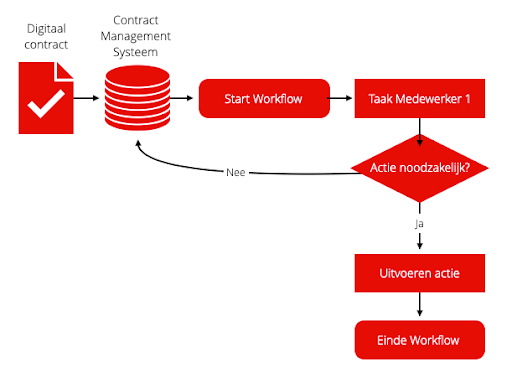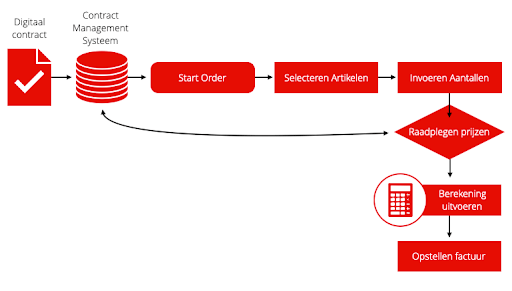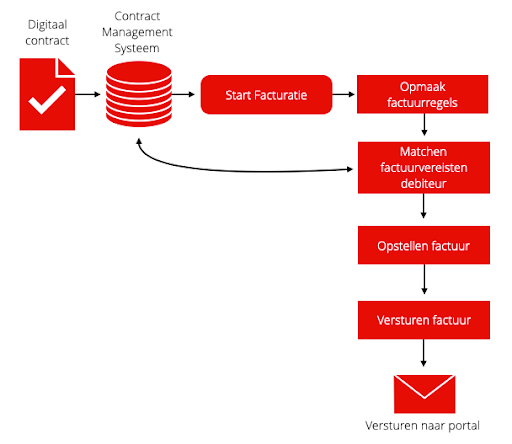'One Single Truth' is key within the Order-to-Cash process
The contract is the basis of an invoice. Therefore it is important that all parties involved in the Order-to-Cash (O2C) process work with the same, correct data. This so-called 'One Single Truth' facilitates the O2C process. By using a contract management system, which doesn't have to be complicated, you can document this thoroughly and at the same time improve the O2C process.
The O2C process affects the entire organization. Contract, order, and project management are of great importance. It is important to take the contract as a starting point so that everyone works with the same, correct data. Invoices should not be late, incorrect, or incomplete. To secure contracts properly in an organization, the 'One Single Truth' is much needed. But that everyone subsequently interprets data in the same way is a second matter.
Dates, triggers, and milestones
It starts with the proper storage of contracts. Ideally, they should be stored digitally and indexed so that they are easier to find. Consider storing PDF documents with text, where often documents are still scanned and the text 'photo' is displayed.
Cleverly capturing all the information contained in contracts is the key to success. Consider, for example, the effective and expiration dates, notice periods, and milestones. This data starts the subprocess every time. To make this successful, a contract management system can help. It can set a deadline when information can be shared with an employee. He or she is then triggered to take action such as renew or cancel the contract, or actually invoice.
You can digitize these internal processes using a workflow. Schematically, a trigger from a contract and the start of a workflow can look like this.

Prices and price agreements
The contract contains price lists and price agreements, such as discounts when purchasing certain quantities. Price lists are a fixed element of an order and part of the order management system. Contractual data combined with an order management system ensures that the correct prices are always used when preparing an order and final invoice. Automated estimations take into account the duration and duration of a contract, quantities and changes to a price when achieving the defined volumes.
Schematically, this could look like the following:

Setting up such a system requires time, focus, the necessary precision and a lot of testing. But when it is set up optimally and plays its part in the 'One Single Truth', the system contributes enormously to the speed, accuracy and completeness of an invoice.
Master data and invoice requirements
The 'One Single Truth' is not only applicable to prices, but applies to all master data: Debtor name and address details, Chamber of Commerce and VAT number, payment terms and deadlines. It is also important to include invoice requirements in the contract and enforce them consistently for a debtor. This is especially true for organizations that deliver to the government or operate within the healthcare industry. In those types of organizations, there are often strict conditions attached to an invoice and how it must be delivered.
Having employees keep track of those conditions can bring human error, resulting in non- or delayed payments. Therefore, it is better to use a functioning contract management system that keeps track of the conditions. The ERP system, in which the invoices are subsequently generated, must also be able to retrieve this information. In this way, the invoice immediately meets the correct requirements and each debtor receives an invoice in accordance with the contract.
Schematically, this could look like the following:

The contract always is the basis
A complete and well-operated contract management system affects several steps within the invoicing process. Those steps vary by organization, but a contract always forms the basis of an invoice. Often, one person carries out the business. In small organizations with a manageable number of contracts and debtors, this need not be a major risk. For larger organizations and organizations that are growing rapidly, the situation is different. Employees cannot be expected to apply all the minor exceptions such as milestones, price, staffing levels, master data or other contractual agreements by heart or by means of their own notes.
Implementing a contract management system does not have to be complicated. There are ERP systems where a simple contract management solution is already integrated. Organizations with a CRM system that they only use for sales or prospects could investigate whether a contract module, which is linked to a customer or prospect, would be a solution. In addition, there are standalone contract management systems. These can function seamlessly with the existing ERP or billing system through API links.
Related content
-
Blog
How the technology of Microsoft Fabric can help you maximize the value of your data
-
Article
How Lakehouse technology can help solve your siloed data problem
-
Blog
EFRAG’s simplified ESRS: what it means and why sustainability reporting still matters
-
Blog
Webinar takeaways: How to deal with common challenges in your data projects
-
Article
Why CFOs can’t afford to ignore Data Engineering in 2025
-
Article
Power BI training: from data literacy and data modeling to strategic reporting in finance